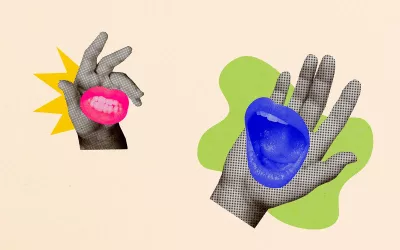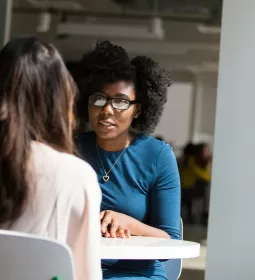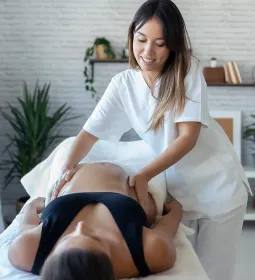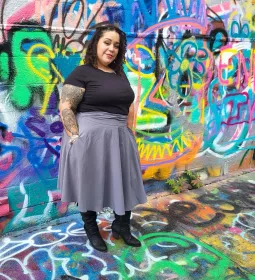Often when I’m teaching or writing, I bring up the topic of connection. Typically, it’s in the context of connecting with our clients. But what about with each other? It’s frequently noted that being a massage therapist or bodyworker can be a lonely profession, especially for those in private practice.
Even those who work in a clinic or spa setting (especially a busy one) may find that there isn’t a lot of time to connect meaningfully with colleagues. It could be one of the reasons why practitioners experience burnout. Or why ethical issues get in the way of therapeutic outcomes. Or why some practitioners get stuck in their same approaches and can only get clients to progress so far. Sometimes, you need someone with whom to share your experiences and brainstorm ideas.
Who Do You Go to in Challenging Situations?
This is especially important for new professionals; however, it’s beneficial no matter what career stage you’re in. While there are many virtual opportunities available that are worthy of inclusion in your overall support network, I want to focus on building a local, in-person group of bodywork professionals.
Why In-Person Connection Matters
While there are multiple reasons I could present on why in-person connection matters, two are primary: energetic exchange and relationship building.
Energetic Exchange
When we connect in person, there’s a physical exchange of energy. Think of it as the difference between a client receiving loving touch versus using a massage gun for their aches and pains. While the massage device might relieve some symptoms, the intricacies of the problem aren’t addressed. The overall picture of what brought on the condition or situation remains unseen. The electromagnetic effects that occur with human touch are missing from the healing experience.

Sitting face-to-face with each other carries a similar current. Being able to witness body language, feel the energy of words and emotions that emit when a person speaks, hear their tone of voice, look directly into their eyes to convey care and concern, and lean in to show your presence and attention is unmatchable to a virtual environment. When a listener experiences this type of whole-body feedback in proximity, they are more likely to be open to your ideas and receive guidance. They feel seen and heard, which regulates the nervous system (especially when they are particularly charged about a challenging situation or feel anxious about what to do). The same applies when you are the speaker and someone listens to you in this way.
Ask yourself: How often in a text exchange or social media post have you felt misunderstood? You state your thought, and someone receives it quite differently from how it was meant. In a virtual exchange, it’s much more difficult and time-consuming to engage in the back-and-forth process of gaining understanding. In person, this can happen quickly and easily, especially when using active and healthy communication skills. Wouldn’t it be more valuable to spend that time on brainstorming a solution to the concern that’s being presented in the first place?
Relationship Building
When we support each other, we build relationships. Although relationships can be built virtually, most of the time the ones that stick eventually result in a mutual desire to meet in person. There’s a reason for that. It’s more powerful because there’s more depth to the connection. Recall being in school and talking to classmates about difficult coursework, clinic experiences, fears upon graduation, etc. The community of school isn’t just about learning from instructors, it’s about connecting with and learning from each other. While not everyone bonds with their classmates, there’s something special about the bonds that form in massage or bodywork trainings. Having visited massage schools as part of my job for many years, I witnessed it time and again.
Although relationships can be built virtually, most of the time the ones that stick eventually result in a mutual desire to meet in person.
The in-person requirement of learning manual therapy skills illuminates the value of being in the same room, learning together. If you were in a hybrid learning environment, compare your experiences of connecting on a virtual platform for theoretical courses versus being in the classroom. The depth of learning that occurred online was likely no match to the learning that occurred during live discussion opportunities. This is the same when we engage in face-to-face discussions with colleagues.
How to Connect with Local Professional Colleagues
Here are a few ways to connect with others in your local community:
-
Go to Massagetherapy.com and look up practitioners in your area. Call or email individuals whose listings pique your interest and inform them of your intent to organize a local support group. Yes, this can feel a bit bold at first. But if the practitioner isn’t into the idea, you can move on to the next. You might be surprised to find that others want to connect but haven’t been courageous enough to take the initiative.
-
If cold calling isn’t your thing, create a plan over a few months to schedule bodywork from several local practitioners. If you like their work, schedule a trade. Then, ease into the conversation about setting up a local support group.
-
If you are already involved with an online community of practitioners, ask if there are any in your area and go from there as previously described.
A good way to start is to meet at a coffee shop or similar public location. As the organizer, have an agenda to create structure. It doesn’t have to be overly formal but have a plan that involves a round of introductions followed by 2–3 prepared topics of discussion. Future meetings can be more free-flowing. The group can then determine what this looks like going forward.
Think Support, Not Competition
If you have the mindset that you are communing with the competition, consider this—the word competition originates from the Latin word competere, which means “to meet or come together.” Going further, it is “the action of seeking or endeavoring to gain what another is endeavoring to gain at the same time.”1 In the typical interpretation of competition, this would equate to opposition. Perhaps we can reframe this to mean coming together to be in service to the greater community. Because, the fact is, there are plenty of clients to go around. The more we support each other in skill development, client-centered approaches, and overcoming obstacles that get in the way of maintaining healthy, therapeutic relationships, the more knowledge and experience we gain together. And we grow, individually and collectively.
Note
1. Etymonline, “Origin and History of Competition,” accessed May 20, 2025, https://etymonline.com/word/competition.








